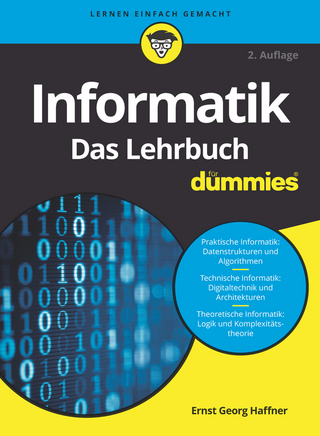
Effective Polynomial Computation
Springer-Verlag New York Inc.
978-1-4613-6398-9 (ISBN)
Effective Polynomial Computation provides much of the mathematical motivation of the algorithms discussed to help the reader appreciate the mathematical mechanisms underlying the algorithms, and so that the algorithms will not appear to be constructed out of whole cloth.
Preparatory to the discussion of algorithms for polynomials, the first third of this book discusses related issues in elementary number theory. These results are either used in later algorithms (e.g. the discussion of lattices and Diophantine approximation), or analogs of the number theoretic algorithms are used for polynomial problems (e.g. Euclidean algorithm and p-adic numbers).
Among the unique features of Effective Polynomial Computation is the detailed material on greatest common divisor and factoring algorithms for sparse multivariate polynomials. In addition, both deterministic and probabilistic algorithms for irreducibility testing of polynomials are discussed.
1 Euclid’s Algorithm.- 1.1 Euclidean Algorithm.- 1.2 Diophantine Approximations.- 1.3 Continued Fractions.- 1.4 Diophantine Equations.- 2 Continued Fractions.- 2.1 Basics.- 2.2 Matrix Representation.- 2.3 Continuant Representation.- 2.4 Continued Fractions of Quadratics.- 2.5 Approximation Properties.- 2.6 Continued Fraction Arithmetic.- 3 Diophantine Equations.- 3.1 Two Variable Linear Diophantine Equations.- 3.2 General Linear Diophantine Equations.- 3.3 Pell’s Equation.- 3.4 Fermat’s Last Theorem.- 4 Lattice Techniques.- 4.1 Lattice Fundamentals.- 4.2 Minkowski Convex Body Theorem.- 4.3 Reduced Bases.- 4.4 Finding Numerical Relationships.- 5 Arithmetic Functions.- 5.1 Arithmetic Functions.- 5.2 Asymptotic Behavior of Arithmetic Functions.- 5.3 Distribution of Primes.- 5.4 Bertrand’s Postulate.- 6 Residue Rings.- 6.1 Basic Properties of ?/m?.- 6.2 Chinese Remainder Theorem.- 6.3 Multiplicative Structure of ?/m?.- 6.4 Quadratic Reciprocity.- 6.5 Algebraic Extensions of.- 6.6 p-adic Numbers.- 6.7 Cryptosystems.- 6.8 Sums of Squares.- 7 Polynomial Arithmetic.- 7.1 Generalities.- 7.2 Polynomial Addition.- 7.3 Polynomial Multiplication.- 7.4 Fast Polynomial Algorithms.- 7.5 Polynomial Exponentiation.- 7.6 Polynomial Substitution.- 8 Polynomial GCD’s: Classical Algorithms.- 8.1 Generalities.- 8.2 GCD of Several Quantities.- 8.3 Polynomial Contents.- 8.4 Coefficient Growth.- 8.5 Pseudo-Quotients.- 8.6 Subresultant Polynomial Remainder Sequence.- 9 Polynomial Elimination.- 9.1 Symmetric Functions.- 9.2 Polynomial Resultants.- 9.3 Subresultants.- 9.4 Elimination Examples.- 10 Formal Power Series.- 10.1 Introduction.- 10.2 Power Series Arithmetic.- 10.3 Power Series Exponentiation.- 10.4 Composition of Formal Power Series.- 10.5 Reversion of Power Series.- 11Bounds on Polynomials.- 11.1 Heights of Polynomials.- 11.2 Uniform Coefficient Bounds.- 11.3 Weighted Coefficient Bounds.- 11.4 Size of a Polynomial’s Zeroes.- 11.5 Discriminants and Zero Separation.- 12 Zero Equivalence Testing.- 12.1 Probabilistic Techniques.- 12.2 Deterministic Results.- 12.3 Negative Results.- 13 Univariate Interpolation.- 13.1 Vandermonde Matrices.- 13.2 Lagrange Interpolation.- 13.3 Newton Interpolation.- 13.4 Fast Fourier Transform.- 13.5 Abstract Interpolation.- 14 Multivariate Interpolation.- 14.1 Multivariate Dénse Interpolation.- 14.2 Probabilistic Sparse Interpolation.- 14.3 Deterministic Sparse Interpolation with Degree Bounds.- 14.4 Deterministic Sparse Interpolation without Degree Bounds.- 15 Polynomial GCD’s: Interpolation Algorithms.- 15.1 Heuristic GCD.- 15.2 Univariate Polynomials over ?.- 15.3 Multivariate Polynomials.- 16 Hensel Algorithms.- 16.1 m-adic Completions.- 16.2 One Dimensional Iteration.- 16.3 Multidimensional Iteration.- 16.4 Hensel’s Lemma.- 16.5 Generalizations of Hensel’s Lemma.- 16.6 Zassenhaus’ Formulation of Hensel’s Lemma.- 17 Sparse Hensel Algorithms.- 17.1 Heuristic Presentation.- 17.2 Formal Presentation.- 18 Factoring over Finite Fields.- 18.1 Square Free Decomposition.- 18.2 Distinct Degree Factorization.- 18.3 Finding Linear Factors.- 18.4 Cantor-Zassenhaus Algorithm.- 19 Irreducibility of Polynomials.- 19.1 Deterministic Irreducibility Testing.- 19.2 Counting Prime Factors.- 19.3 Hilbert Irreducibility Theorem.- 19.4 Bertini’s Theorem.- 20 Univariate Factorization.- 20.1 Reductions.- 20.2 Simple Algorithm.- 20.3 Asymptotically Good Algorithms.- 21 Multivariate Factorization.- 21.1 General Reductions.- 21.2 Lifting Multivariate Factorizations.- 21.3 Leading Coefficient Determination.- 21.4Multivariate Polynomials over Q.- 21.5 Bivariate Polynomials over Fields.- List of symbols.
| Reihe/Serie | The Springer International Series in Engineering and Computer Science ; 241 |
|---|---|
| Zusatzinfo | XI, 363 p. |
| Verlagsort | New York, NY |
| Sprache | englisch |
| Maße | 155 x 235 mm |
| Themenwelt | Mathematik / Informatik ► Informatik ► Theorie / Studium |
| Mathematik / Informatik ► Mathematik ► Algebra | |
| Mathematik / Informatik ► Mathematik ► Analysis | |
| Mathematik / Informatik ► Mathematik ► Angewandte Mathematik | |
| Mathematik / Informatik ► Mathematik ► Arithmetik / Zahlentheorie | |
| Schlagworte | Algebra |
| ISBN-10 | 1-4613-6398-5 / 1461363985 |
| ISBN-13 | 978-1-4613-6398-9 / 9781461363989 |
| Zustand | Neuware |
| Informationen gemäß Produktsicherheitsverordnung (GPSR) | |
| Haben Sie eine Frage zum Produkt? |
aus dem Bereich


